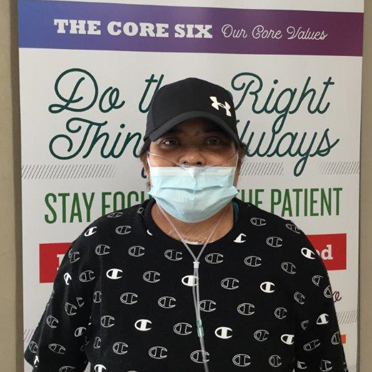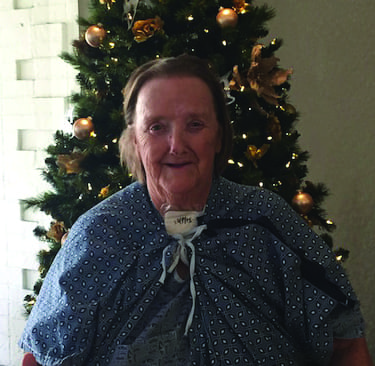Maggie
“I thank God for the opportunity to come to Kindred.”
Just two days before the New Year, Maggie and her roommate were both diagnosed with COVID-19, but it was Maggie who would be the one who had to be hospitalized as her condition rapidly deteriorated.
Read more about Maggie

 Unable to breathe on her own anymore, Maggie had to be placed on a ventilator and she slipped into what would be a coma that lasted for two months. When she began to show signs of awareness and was stable enough to withstand a transfer, she was brought to Kindred Hospital San Gabriel Valley to begin respiratory therapy and rehabilitation. Even though she was profoundly weak and started her recovery in the ICU at Kindred, Maggie was always motivated to participate and every day she would try to do more than she had in her previous rehab session. She progressed quickly from goal to goal and as she regained her strength and mobility, she eagerly applied herself to get back the abilities she had lost. Now able to get up and stand on her own and walk with a walker, Maggie continued to surprise everyone on her team with her determination and willingness to recover. With her sights firmly set on getting back to doing the things she loved to do before getting sick, like hiking and going to the beach, Maggie looked forward to her daily rehab sessions in the therapy gym.
Unable to breathe on her own anymore, Maggie had to be placed on a ventilator and she slipped into what would be a coma that lasted for two months. When she began to show signs of awareness and was stable enough to withstand a transfer, she was brought to Kindred Hospital San Gabriel Valley to begin respiratory therapy and rehabilitation. Even though she was profoundly weak and started her recovery in the ICU at Kindred, Maggie was always motivated to participate and every day she would try to do more than she had in her previous rehab session. She progressed quickly from goal to goal and as she regained her strength and mobility, she eagerly applied herself to get back the abilities she had lost. Now able to get up and stand on her own and walk with a walker, Maggie continued to surprise everyone on her team with her determination and willingness to recover. With her sights firmly set on getting back to doing the things she loved to do before getting sick, like hiking and going to the beach, Maggie looked forward to her daily rehab sessions in the therapy gym.
“I thank God for the opportunity to come to Kindred,” Maggie expressed. “It will be good to live a normal life again and I am looking forward to getting back to my job in accounting where I’ve worked for 15 years – I love the work I do.”
Linda
A Miraculous Recovery
Linda was very active and stayed busy around the house, raising chickens, gardening, taking her dogs for walks around the lake, carving wooden walking sticks and playing board games. She was also a long-time smoker who suffered from COPD, a heart condition, and also had high blood pressure.
Read more about Linda

One day, Linda became short of breath and unable to breathe normally - ominous signs that indicated she was in the throes of experiencing a pulmonary and cardiac arrest. When the paramedics arrived Linda had to be intubated on site and she was rushed to the nearest community hospital. There, she was also diagnosed with pneumonia and her medical prognosis was very uncertain.
Shockingly, the first doctor to see her recommended the removal of the ventilator, which would have resulted in her death. Fortunately, Linda remained on the ventilator and was transferred to Kindred Hospital, even though her doctor told Kindred clinicians that that allowing her to recover was preventing the inevitable. Fortunately for Linda, the staff at Kindred Hospital were determined to prove him wrong.
At Kindred, Linda received the type of care she needed to begin what was nothing less than a miraculous recovery. She began to regain her strength and made great progress in respiratory and physical therapy. Soon she was able to get in and out of bed and re-learn many of the simple things that she had lost the ability to do.
When Linda came to Kindred she was lifeless, dependent on a ventilator and breathing tube, and unable to move or even remember names. At the time of her discharge, Linda said, "I'm so happy to be strong again so I can be with my family." Her son added that he was "so impressed with mom's healing… I thank all those who were positive along this difficult journey."
Linda added, "Thank you, Kindred. I hope to never smoke cigarettes again."
All of us who cared for Linda wish her and her family all the best and want to encourage her to remain smoke-free so she can continue to regain her health and enjoy everything that life has to offer!
Paula
Never Gave Up Hope – Now She’s Going Back Home Again
When Paula became ill unexpectedly she had to be rushed to the ER in an ambulance.
Read more about Paula

She was found to have critically low levels of potassium in her blood and was in an altered state due to the imbalance. Her breathing was compromised and she had to be intubated to assist her breathing. Unfortunately, she aspirated after her intubation and this led her to develop aspiration pneumonia and acute respiratory distress syndrome.
She was transferred to the ICU for treatment and observation and, once her condition was able to be stabilized, she came to Kindred Hospital for specialized respiratory and rehab therapy, and to be weaned from the ventilator.
When she arrived at Kindred she was extremely weak and unable to take food by mouth. Paula had to receive her nutrition though a feeding tube in addition to the ventilator support. At first, Paula needed encouragement to start participating in her rehab treatments, but with encouragement from her husband and her care team she began to make rapid progress.
Paula was able to be successfully weaned from the ventilator and, once the tracheostomy tube was removed, she was able to eat on her own again. She progressed to being able to walk with a walker and was able to do everything on her own with very little help. Just before she was discharged from Kindred to continue her recovery at home, Paula shared her thoughts about the ordeal: “The moment you’re ready to quit is usually the moment right before a miracle happens. Don’t give up!”
Paula also wanted to express her gratitude and added: “I want to give my thanks to the entire staff – especially Roberto and Gloria – I couldn’t have done this without them.”
All of us at Kindred wish Paula and her family the very best and that she is able to get her health back completely.